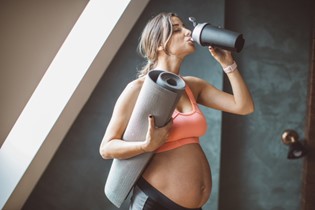This is why staying fit in pregnancy is important

Pregnancy may seem like the perfect time to throw exercise out the window and wallow on the sofa, ice-cream tub in hand, for nine months of blissful lounging. But exercising during pregnancy not only helps you to feel better, it also prepares your body for labour and makes those early days easier to cope with.
Exercising during your pregnancy may seem like the very last thing you want to do. But exercise helps to build the stamina required for labour and delivery. It can also help stabilise your overall weight during pregnancy. If you start pregnancy heavier, then gain too much weight, this can negatively impact on your blood glucose levels and blood pressure. However, being underweight during pregnancy can prevent the baby from growing properly, and can result in bed rest for the mother-to-be due to a lack of energy.
There are many advantages to staying fit throughout pregnancy. Firstly, you'll feel better about yourself, due to the positive endorphins that are produced during exercise. A good exercise regime promotes better sleep at night and more energy during the day. You'll also become well prepared for the physical demands of labour, due to increased stamina and cardiovascular endurance, as well as the strength that is required from the pelvic floor muscles and quadriceps. Labour can be like an endurance event, so it makes sense to train for it!
If you haven't exercised before, it's not too late to start, even if you're pregnant. However, it is exceptionally important to listen to your body throughout any exercise, and to stop if you experience pain, bleeding or dizziness - although ensuring that you never exert yourself to this level is the key. Also, if you experience any ongoing pelvic or lower back pain while exercising, you should see a women's health physiotherapist. In such cases, your exercise routine may need modification.
Physiotherapist Lisa Yates explains, "Sometimes nausea in the first trimester can make it difficult for even the most conscientious person to stick to their exercise plan. So often this is another reason for exercise modification. You just need to listen to your body and adapt your routine accordingly."
Any exercise you do should feel of a moderate intensity. You should be able to talk comfortably while exercising, yet also feel like you have a slightly elevated heart rate. You can tell your heart rate is elevated when you are lightly perspiring and are puffing slightly. But you should never be drenched in sweat or red in the face, unable to talk without gasping for breath. If so, you need to lower the intensity.
Do not exercise if you feel you are unwell, or even if you feel you are coming down with something. A pregnant woman's immune system is slightly lower than a non-pregnant woman's, and so she is much more susceptible to illness. Exercise will only continue to lower the immune system, resulting in illness and a longer recovery period.
WHAT EXERCISE NOT TO DO WHEN PREGNANT
Types of exercise not recommended for pregnant women are:
• Contact sports, or sports which require rapid directional changes (like tennis, squash, or netball)
• Hard, repetitious movements (like in aerobics) should be done with care
• Don’t start a new exercise programme if you’re pregnant without talking it over with your LMC and a fitness professional first
It is important to exercise within your own comfort zone or ability. Whatever exercise regime you had before you were pregnant can generally be continued until it becomes too uncomfortable.
If you haven't been doing any regular exercise before the pregnancy and would like to begin, then walking is your safest and most beneficial option. Try to walk four times a week for at least half an hour.
Walking regularly, swimming, prenatal aquaerobics, yoga, and Pilates classes are all good exercise options, as well as light weight training (ensure weights do not exceed 4kg). Women who have been very fit prior to pregnancy are able to continue their training as usual in the first trimester, but should tailor it to be more moderate for their second and third trimesters.
When you’re pregnant, the following types of exercise are recommended:
• Walking is excellent for pregnant women, but don’t over-exert yourself.
• Attend aquaerobics classes, as the water will support your body, which is comforting and relaxing.
• Find out if there are any antenatal exercise classes in your community that you could attend.
• If you were a runner before pregnancy, you may continue. If you were not, stick to walking instead.
• Yoga is not only helpful for exercise, but it also teaches you breathing exercises that are useful for labour.
Remember to drink plenty of water when you exercise! It is important that you are well-hydrated, so that your core temperature stays comfortable. Also, it is advisable not to exercise in hot environments. Making sure that you have eaten prior to exercising is also paramount, so that your blood sugar stays balanced and you have adequate energy for the chosen exercise. If not, nutrients will be taken away from your baby in order to maintain your working body.
It is also very important to exercise your pelvic floor muscles, so as to help reduce the chances of developing problems with incontinence during and after pregnancy. Read "Pay attention to your pelvic floor!" for more information about this. In some areas of New Zealand there are special exercise programmes for pregnant women, and many local gyms have classes for pregnant and postnatal women. Ask your LMC or go to your local gym or women's centre for details.
Some pregnant women will need to take special care when considering exercising.
You should discuss your exercise plan with your LMC if:
• You have a history of miscarriage.
• You have heart disease or diabetes.
• You have cervical incompetence (when the cervix dilates in the second stage of pregnancy).
• You are having more than one baby at the same time (twins or other multiples).

AS FEATURED IN ISSUE 4 OF OHbaby! MAGAZINE. CHECK OUT OTHER ARTICLES IN THIS ISSUE BELOW

















